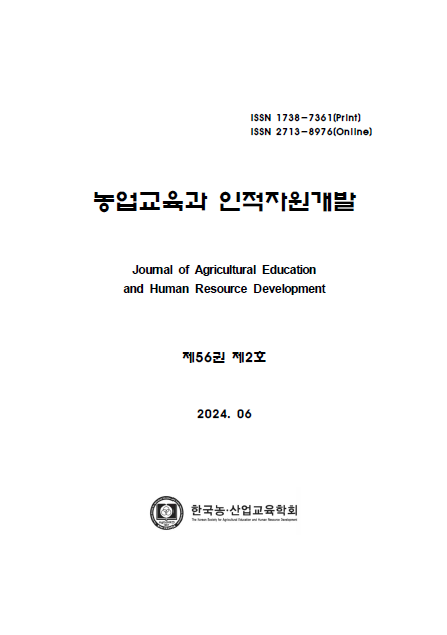국내 근로자의 조직변화태도에 관한 연구동향 분석
Change of Korean Workers
- 한국농산업교육학회
- 농업교육과 인적자원개발
- 제56권 제2호
-
2024.061 - 29 (29 pages)
-
DOI : 10.23840/agehrd.2024.56.2.1.
- 216

이 연구는 국내 근로자의 조직변화태도 연구동향을 분석하여 조직변화태도 연구를 수행하는 데 필요한 기초 자료를 제공함과 동시에 향후 연구 수행 방향에 대한 시사점을 제공하는데 목적이 있다. 연구 목적에 따라 조직변화태도 변인에 해당하는 조직변화몰입, 조직변화수용, 조직변화준비, 조직변화개방성, 조직변화저항, 조직변화냉소주의 연구물의 연구시기, 연구대상, 연구방법, 분석방법, 변인 역할, 연구 분야에 대한 동향을 분석한 결과는 다음과 같다. 첫째, 수집된 조직변화태도 연구물은 총 159편으로 2005년에 처음 연구가 시작되었고, 2020년대부터 급증하여 현재까지 꾸준히 연구가 수행되고 있다. 둘째, 조직변화태도는 주로 기업 및 공공기관 근로자를 중심으로 연구됐으나, 최근 연구대상의 범위가 확장되고 있다. 셋째, 연구방법 측면에서 대부분 양적연구에 치우쳐 있으며, 그 중에서도 조사 연구가 주를 이루고 있다. 넷째, 분석방법 측면에서 변인 간 관계를 구명하는 회귀분석 및 구조방정식 분석이 가장 많이 활용되고 있다. 다섯째, 조직변화태도는 종속변인으로 활용된 연구가 가장 많았고, 매개변인, 독립변인, 조절변인 순으로 뒤를 이었으나, 각 변인마다의 역할에는 차이가 있다. 해당 연구 결과를 바탕으로 향후 조직변화태도 연구 수행 방향에 대한 제언을 제시하였다.
This study aims to analyze the research trends concerning the attitudes of Korean workers towards organizational change. It provides fundamental data for future research on this topic and suggests directions for further investigation. The study collected and analyzed research papers focusing on various variables of organizational change attitudes, including organizational change commitment, acceptance, readiness, openness, resistance, and cynicism. The research subjects, research methods, analysis methods, research fields, and variable roles were analyzed according to the research period. The results are as follows. First, a total of 159 research papers on organizational change attitude were collected. The research started in 2005 and has been increasing rapidly since the 2020s. Second, the research subjects were mainly employees of companies and public institutions, but the range of research subjects is expanding. Third, the most commonly used research method was quantitative research method, and among them, only survey research method was used. Fourth, regression analysis and structural equation modeling are the most commonly used techniques to explore relationships between variables. Fifth, organizational change attitudes are most frequently used as dependent variables, followed by mediating, independent, and moderating variables, with varying roles. Based on these findings, the study offers suggestions for future research directions on organizational change attitudes.
I. 서론
II. 이론적 배경
III. 연구 방법
IV. 연구 결과
V. 결론 및 제언
참고문헌
(0)
(0)